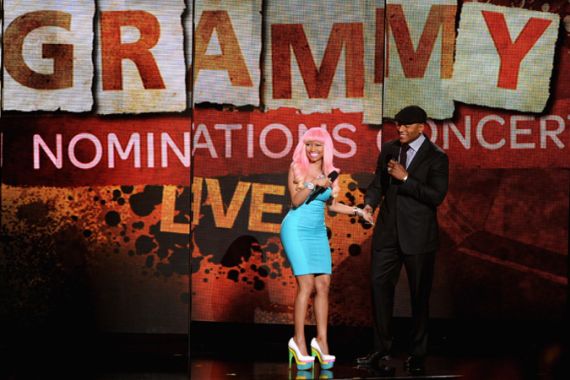Is it time to Occupy the Grammys?
The recent cuts in Grammy Award music categories display an audacious cultural insensitivity.

 |
| Bobby Sanabria is an outspoken critic of the Grammy’s cuts, and is taking legal action [GALLO/GETTY] |
New York – While American politics and policies are usually a turnoff to global audiences, American music has always been a big turn-on. The reason: It echoes and communicates the energy and diversity of a vibrant culture.
Music moves hearts and feet as well as minds, which is why it has always been the secret weapon of choice used by the State Department to garner support overseas. It also drives our cultural industries to market music – not just as a money-making export, but also as an inspirational and powerful social force.
Entertainment companies understand these values and have become international salesmen for the sounds of a higher consciousness, as international sales now account for more than half their revenues.
Awards shows like the Oscars and Grammys attract audiences in the billions because of the ways in which their creators – who are also increasingly international – find ways to transcend borders and resonate with the feelings and sensibilities of a vast audience. In the farthest corners of the world, you will now find local rappers emulating a musical form born in the South Bronx. Go to the world’s bars, joints, concert halls and dance floors, and you will see the influence of Latin music and jazz.
This has happened in part as our country has birthed a plethora of cultural streams and artistic communities, and then awarded their most talented representatives with global visibility.
There has always been tension between those who are there just to cash in and commercialise creative expression, and those who see musical diversity as a source of strength and the reason that America is so, well, American.
Sometimes the profiteers and the performers fuse, but more often than not there is a clash between parochialism and universalism, between the revenue-maximising suits on top and the struggling artists who serve and advance musical traditions that are not always in the mainstream, even as musical geniuses transcend genres.
Today, there is a cultural war underway in the world of the Grammys as well as in the courts. A battle is now being waged between NARAS, the professional academy that gives out the awards, and many performers who are now being driven out of competition because of a decision to eliminate musical categories that have long been part of the mix.
You can understand why bottom-line-oriented TV executives and advertisers might want to streamline and package events to maximise ratings and profits by only showcasing big stars. But what they don’t get is that eliminating key musical traditions leads to homogenisation. It turns branches of the American musical tree into endangered species by denying them visibility and global exposure; it robs the audience of a chance to see and appreciate new music.
The BBC in London recently interviewed Bobby Sanabria, a multi-Grammy nominated jazz, Latin jazz, and Latin music
|
“What an insult to all of us (and our supporters) that such a monumental decision was announced with an email, after no consultation and no chance for an informed debate! “ – Dr Ben Lapidus |
artist. He is now the lead plaintiff on the historic class-action lawsuit filed on August 1 in the New York State Supreme Court against NARAS for its elimination of the Latin jazz category.
Sanabria believes that cutting 70 per cent of the categories affecting minorities is fundamentally racist. According to Sanabria, “It leads to a lack of diversity in the Grammy broadcast that then focuses more on stars and celebrities turning it into a corporate showcase of big stars. The Grammys were also formed to champion marginalised forms of music and educate the public.”
Another artist, Dr Ben Lapidus, is denouncing what the Grammy overlords have done. He is a Latin jazz artist, associate professor of music, and a 10-year member of NARAS.
Writing in Latin Beat Magazine, he explains:
On April 6, 2011, I, and the rest of the 21,000 members of the academy received an email from NARAS announcing a major restructuring of the Grammy awards. Chief among these changes was the elimination of 31 award categories. Some of the cuts included Cajun, Zydeco, Native American, Contemporary Jazz, Traditional and Contemporary Blues and Gospel. Two dissimilar Mexican categories were also combined and Latin jazz was eliminated.
I was stunned. It was 1994 when Eddie Palmieri finally won a struggle that began 17 years earlier for the establishment of the Latin jazz category. Since then, the success of Latin jazz as a category (and as a music) has grown nationally and internationally.
What an insult to all of us (and our supporters) that such a monumental decision was announced with an email, after no consultation and no chance for an informed debate! Not even the chapter governors in the 12 Grammy Chapters around the United States, who are elected by the membership to represent us, were consulted.
This top-down decision was announced without any debate. A meeting was called and then prominent artists were excluded from it. Tempers flared at this anti-democratic and culturally offensive process.
Lapidus explains: “It is my understanding that NARAS, as a not-for-profit entity, is required under applicable law to operate in a clear and transparent manner. It certainly did not do so in arriving at the determination to eliminate the 31 categories of music.”
There were originally 109 categories; they have now cut them down to 78. News organisations that seek comment from NARAS have had no response.
In response, a lawsuit has been filed against this exclusionary process. Of course, the music organisation can’t be forced to recognise minority artists, but their decision has caused a definite backlash.
The problem with going to the courts is that issues often turn into legalistic narrow bureaucratic procedures like whether the NARAS constitution permits this type of behaviour. But in fact, the heart of the matter are the morality and importance of its actions. That’s why it is essential for the artists to bring their case to the court of public opinion.
It’s ironic that in a country that now has a president of colour and seems to have come a long way towards eradicating traditional forms of discrimination, a major organisation can take a step that alienates its members and displays audacious cultural insensitivity.
Impassioned publicist Sarah R Bisconte has been able to get this story out all over the world, especially in the British media. However, many star-promoting US entertainment outlets and cable news networks have ignored the controversy so far, even though Carlos Santana, Paul Simon, Herbie Hancock, Bill Cosby, Bonnie Raitt, Ruben Blades and many other luminaries are backing the Latin artists. (See here for more information, including a petition and statements of support.)
With all that hangs in the balance, don’t be surprised if there’s an Occupy the Grammys at next February’s big Grammy TV show.
News Dissector Danny Schechter made the film Plunder about Wall Street crime.
Follow him on Twitter: @DISSECTOREVENTS
The views expressed in this article are the author’s own and do not necessarily reflect Al Jazeera’s editorial policy.
